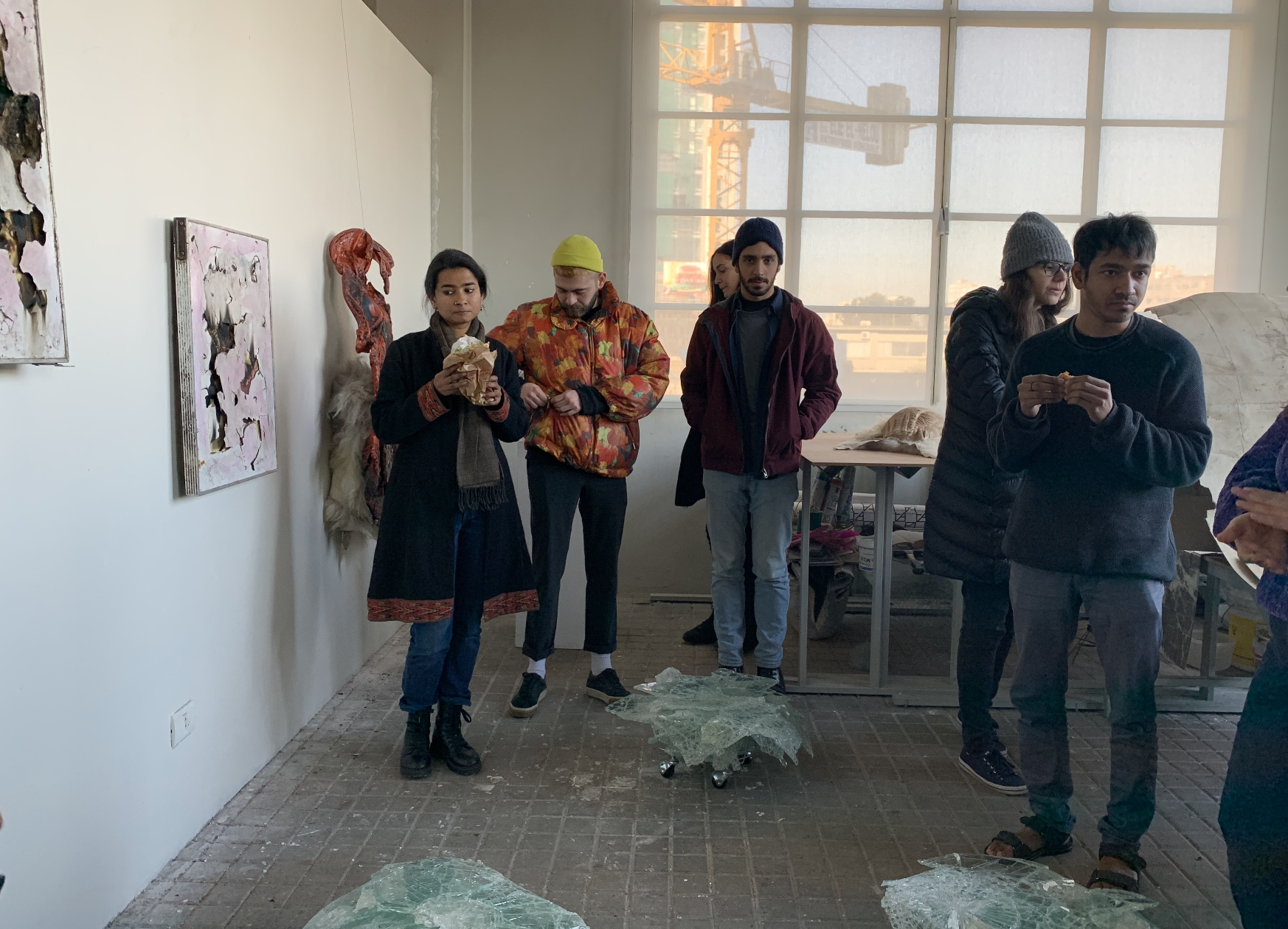Workshops
Workshop I
Joana Hadjithomas and Khalil Joreige
November 25 - December 6, 2019
The October uprisings in Lebanon have invited local artists and visiting fellows of the Home Workspace Program to rethink, unlearn, and make sense of cultural production and its relationship to structures of power and networks of capital.
Following weeks of mass protests and general strikes affecting all sectors, including the artistic-cultural one, this workshop was informed by and organized around the following questions: Can artistic practices embody the dynamics of protest within their occurrence? Should cultural production be halted during a moment of upheaval? How do we formulate the urgency of art in times of crisis? How can cultural production sustain itself and respond to continuous ruptures and regenerations?
Through various encounters and meetings, the workshop invited fellows to question their subject position as well as their modes of production and perception, recalling the various aesthetic forms and artist-led movements that were conceived and generated in response to revolutions and political transitions across the twentieth century.
Workshop II - Performing Images
Yasmine Eid Sabbagh and Mareike Bernie
January 27 - 31, 2020
Investigating into critical artistic/archiving practices?
In the context of a world shaken by wars, ongoing conditions of coloniality and oppression, economization and environmental destruction—all of which bring about new forms of migration and thus a panoply of challenges in society, which expectations do we have towards artistic/archiving practice?
By combining questions around the performativity of images and critical archiving, this workshop aims at investigating the social, political, economic, and ethical contexts and dimensions of these practices.
Which social contracts are contained within an archive? What are the hidden rules of its collections? What kind of images and stories are being stored and which are excluded? To whom do these archives belong and who has access? Which images circulate? And how does the circulation of these images performe and eventually shape our daily perception ? Can we investigate their hidden agendas through performative practice?
By close viewing of divers materials, collective field trips and performative interventions we will critically reflect on various artistic/archiving practices and their conditions of production.
Workshop III - Art/ Cure
Kader Attia with guest professor Stefania Pandolfo
February 17-28, 2020
Rather than exploring a single aspect of my artistic research and process, I have conceived a workshop proposing a series of reflections on two aspects of an endlessly moving practice, which makes me wonder, from which emergency this evolution is the name.
The first part will question the possibilities and limits of the artist’s practice from an ambivalent point of view in regards to representation as a visual and objectified form, and to action as a subjective and collective challenge. How is it possible to go back and forth between an artistic practice and activism, between aesthetics and ethics?
During this part of the workshop, I would like to bring awareness to the social, economical, political stakes of this back and forth movement of rethinking resistance and its limits. How neither as a strategy nor as a sacrifice, a political artistic commitment requires a correlation between an individual and a collective, through the borders of all fields of research.
To do so, I will both evoke the experience of La Colonie, as an artist-run space, and show a selection of my recent films to be discussed together.
In the second part of the workshop, I will first give a lecture on my decade long research on repair, followed by a discussion with my guest Stefania Pandolfo about the complex issue of repair, from a psychoanalytical point of view, and in connection with beliefs.
This workshop is organised in collaboration with La Colonie.
Workshop IV - idle study (as we hold our breath)
With Natascha Sadr Haghighian
April 20-30, 2020
just a moment ago many places we care about had been involved in active processes of revolution, places near and far. artists from different alleyways joined the revolutions, channeling their experience in image making, performativity and building spaces into the movements. Instead of „making works“ they engaged in vocalising, staging and documenting the revolutionary processes. then suddenly everything came to a stand still, or so it seems. As human revolutionary processes were thwarted and choked, an organism of microscopic scale entered the scene and put the entire global machine on hold. this comes as no surprise to art practitioners as they know about the power of small things. in what is called artistic practice, we learn to consider not only the agency of other than human forms of existence, we learn how to improvise, how to time travel, to become other, to imagine impossible futures born from nightmarish legacies, how to embrace change, how to wait while not waiting and how to perpetually make friends with that, which those in power declared war on. we learned and are continuously learning to find other paths, other languages, other forms to relate other than to extract, invade, annihilate and abuse. idleness is our closest ally and our wisest conductor.
Workshop V - The Practice, The Book, The Library
With Rayyane Tabet
May 4- 23, 2020
In August 2018, I visited an abandoned apartment in Furn el Chubbak
In June 2019, I started renovating the apartment with the intention of turning part of it into a library that will hold the books I have amassed over the past 20 years.
In May 2020, we were supposed to have a workshop in that apartment. It was going to focus on thinking together about the potentials of the library as a place of work and a space of conversation.
I am now in San Francisco, separated from most of my books trying to think about how to proceed with the workshop under the current circumstances.









